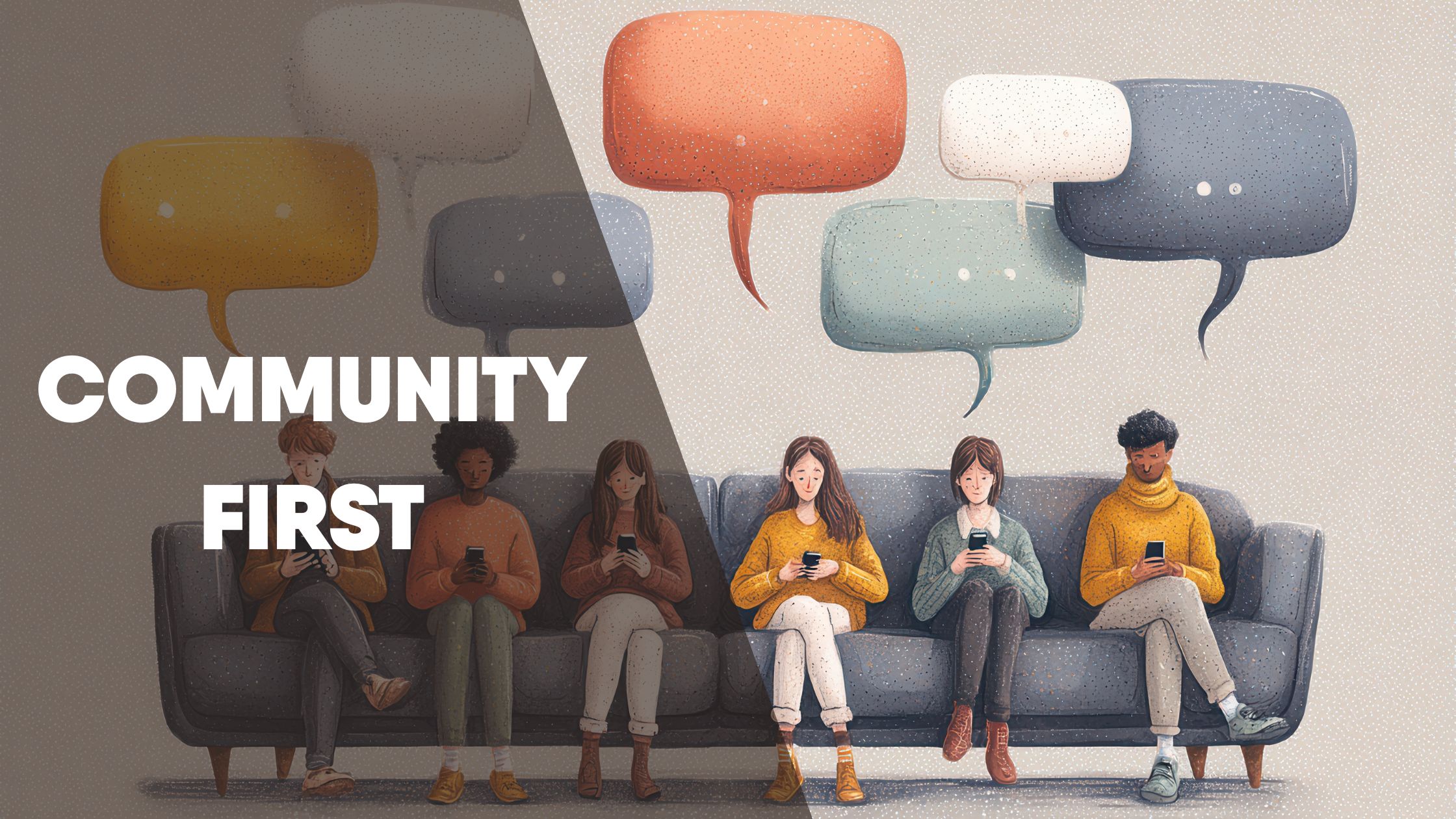It might feel like social media is busier than ever – and to an extent, it is, with many millions of active users across platforms globally. But it may come as a surprise to learn that public social platforms including Facebook and Instagram are losing certain users – and there is a distinct reason for this.
According to Edison Research[1], Facebook had 15 million fewer users in 2024 than it had in 2022 and, during the same period, WhatsApp surpassed Facebook in terms of monthly active user numbers[2].
Why is this?
Social media is supposed to be, first and foremost, social. This isn’t necessarily the case of late. Too many ads, too much algorithmic noise (with algorithms arguably knowing just a bit too much about human users), and a decline in satisfaction are driving some big changes. With a lot of our social media feeds becoming far too overcrowded and impersonal, more users are choosing to shift towards private spaces like Instagram Close Friends, WhatsApp groups, and other private communities.
If you’re a brand employing a social media marketing strategy, don’t panic!
You still need to focus on platforms including Facebook and Instagram for connection, shoppable ads, and to maximise SEO results. Private social media simply adds another layer to the branding and marketing puzzle – and brands can exploit this for strategic marketing purposes.
Why Are Some Users Leaving Facebook & Instagram?
- Ad Fatigue and Algorithm Frustration
Many users are feeling increasingly overwhelmed and overburdened by the constant stream of commercial content on public platforms, with ad-based content showing up far more in newsfeeds and timelines than content from friends and the pages we prefer to follow. Rather than being genuinely engaging, it feels more like engagement bait forcing endless scrolling – and people want more curated, authentically engaging social experiences online.
- Inauthenticity
Does a session spent on Facebook or Instagram leave you feeling exhausted, dejected, discouraged, unworthy, frustrated, angry, or unable to keep up? As US President Theodore Roosevelt said more than a century ago, “Comparison is a thief of joy”. The curated, perfected version of ourselves and our lives that has been presented for the world (or our “friends”) on social media is passe, and Gen Z in particular is leading the charge away from this culture of perfectionism and comparison. Real connection means much more than public performance!
- Data Privacy Concerns:
Concerns about data privacy and security on public social media platforms have driven a lot of users away and spurred a trend towards smaller, private communities where users have more control over their information and interactions.
What are Private Social Networks?
A new era of social networks and apps is emerging. Built around smaller-scale engagement and genuine connections, these serve more intimate, specific audiences rather than catering to billions of users. Apps can be built around niche communities and interests and, in many cases, enable users to find meaningful connections that can be taken offline in the real world – not limited to screens.
Examples of Private Social Media Platforms
- Facebook Groups – used for private communities and organisations
- Geneva – a private group chat app for friend groups, book clubs, and other communities.
- Partiful – light and fun, focused on planning real-world gatherings
- Favs – a social app for close friends only, with no brands, no ads, no influencers; designed to foster real connections with real people
- Locket – widget-based, this app allows close friends to share photos and other updates directly to each other’s home screens with none of the “Noise” of mainstream social media.
- Lex – a platform for LGBTQI+ users
- Girlgroup – for female-focused communities
Others include (but are certainly not limited to) Slack, WhatsApp, Telegram, Facebook Messenger, Semaphore, Pie, 222, Posh, Twitch, and Mastodon.
The Popularity of Private Online Interactions
The rise in popularity of private social media among certain groups reflects a growing user preference for more familiar, better-controlled online communities that are focused on genuine connections, privacy, and handpicked experiences. This reflects a distinct shift away from the public, algorithm-driven nature of traditional social platforms into a more exclusive and comfortable space. Information need not be shared in a public forum.
Users of private social media love it because:
- It’s less toxic than public social spaces online
- There is no intrusive algorithmic targeting
- There are no programmatic ads
Private social media uptake is influenced by:
- A desire for meaningful connections and interactions with like-minded people, fostering a sense of belonging and community.
- Niche communities focused on specialised audience interests, goals, and needs.
- Control and customization to tailor the experience for users.
- Privacy and security, as one of the biggest advantages of using private social is the ability to control who sees your content or communications. You can message one-on-one with someone or with a small group, rather than posting content for all your contacts to see. This creates an environment of intimacy and a place to be yourself and stay in touch with the people who matter the most to you.
“Private messaging, ephemeral stories, and small groups are by far the fastest growing areas of online communication.” – Mark Zuckerberg
How Can Brands Tap Into Exclusive Online Communities?
Marketing in 2025 can be taken to the next level socially by availing of DMs, Groups, and micro-communities. Private social networks built for specific purposesare becoming more popular for businesses and brands. Some businesses and other organizations are even creating their private social networks for customer engagement, community building, and internal communication.
According to Forbes[3], a majority of internet users already participate in online communities. Most people are also more inclined to be loyal to a brand if there is community access.
Businesses can exploit this by offering a branded online space; private social communities online offer brands and creators a unique opportunity to foster trust, belonging, and genuine connections.
Some of the benefits private social networks offer to brands include:
- Enhanced privacy and security: a more secure environment for users, with greater control over who can access their information.
- More meaningful interactions: smaller, exclusive, focused communities enabling deeper, more genuine connections.
- Reduced information overload: a lack of algorithmic feeds can help users escape the noise and find a more manageable stream of information with curated content.
- Brand loyalty and retention: providing an exclusive branded online space may significantly enhance brand loyalty and retention.
- Data ownership and control: you own all the data in your private social media community and can ensure you have your members’ permission to collect their data.
9 Best Practices for Brands
Availing of the opportunities private social media offers requires that brands and marketers understand the purpose and culture of these spaces. They are not the same as traditional social media – and the typical tactics used for social media marketing will not work in these spaces.
- You need to find ways to maintain engagement without being intrusive.
- Rather than monetising through ads, your role is to engage members with high-value content and conversations.
- Rather than triggering clicks, you need to focus on creating deep, quality connections.
- Adhere to your brand identity and voice, and allow your brand guidelines to inform your messaging, visuals, and tone.
- Engage with your audience consistently – encourage interaction, ask questions, run polls, recognise and highlight member contributions, and invite feedback.
- Use a mix of content in terms of articles, polls, images, videos, podcasts, and whatever best works for your brand and your audience.
- Don’t over-promote – your priority on social media should be to build and nurture relationships over selling and promotion.
- Maintain privacy and security, provide access only to your intended audience members, and avoid sharing personal information. Monitor user online behaviour to ensure your private social space is safe and positive.
- Track engagement and analyse metrics including member signups, opt-outs, comments, and reactions to improve your strategy going forward.
Book a Strategy Session With Us!
Need Inspiration & Practical Help? Talk to a Strategist!
The era of social media as we know it is not ending, but simply evolving and expanding. Facebook, Instagram, and all your other preferred social apps are here to stay (at least for the foreseeable future), but there are now some other options to consider – where true connection is a priority.
Dot-to-Dot Digital can work with you to help you understand your target audience, and how they use social media, and make sure that your brand maintains an effective, inviting social presence on the most beneficial platforms for your audience.
Ready to embark on an exciting journey? Get in touch with us today.
[1] https://www.edisonresearch.com/infinite-dial-2019/
[2] https://venturebeat.com/business/app-annie-whatsapp-is-now-facebooks-most-popular-app/
[3] https://www.forbes.com/councils/forbescommunicationscouncil/2025/02/03/the-biggest-social-media-trends-shaping-2025/










